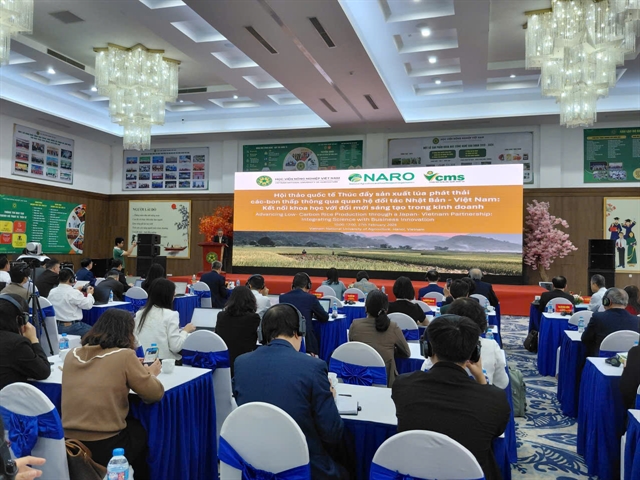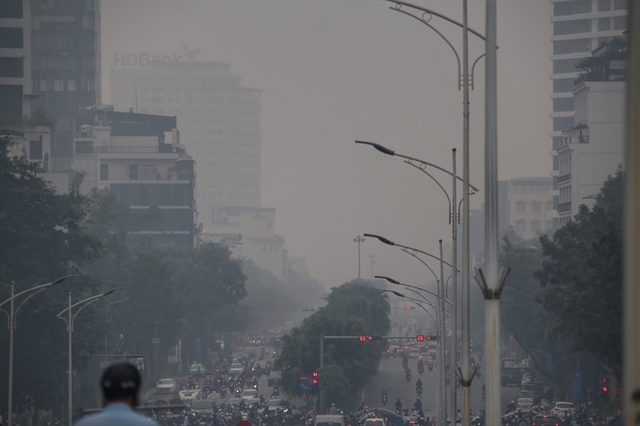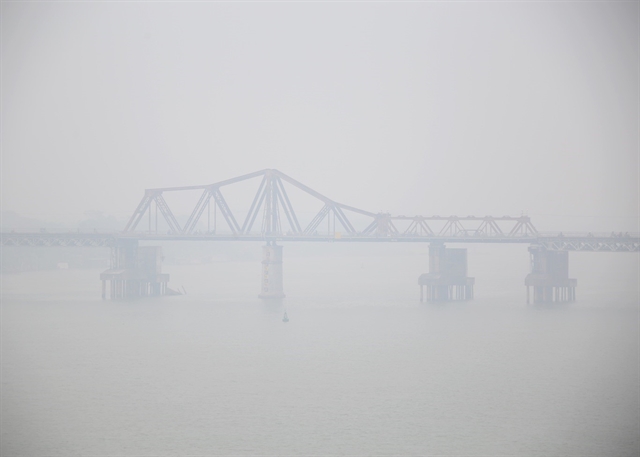 Environment
Environment

 |
| Residents in Hà Nội travel to work in a dense pollution. VNA/VNS Photo Tuấn Đức |
HÀ NỘI — Urban residents in Hà Nội have endured a dense mist for over a week, a consequence of the concerning air pollution that necessitates the city to implement proactive measures to safeguard public health.
Hà Nội has been submerged in the misty air filled with fog and dust, particularly affecting those who live in high-rise apartment buildings such as Cầu Giấy, Thanh Xuân, Hai Bà Trưng, Hoàng Mai, Hoàn Kiếm, Đống Đa, and Bắc Từ Liêm.
According to the IQAir application, the air pollution level over the past week has been assessed as poor for sensitive groups. The Air Quality Index (AQI) of Hà Nội has consistently reached a hazardous level.
The concentration of PM2.5 in Hà Nội is currently 10.5 times higher than the annual air quality guidelines set by the World Health Organization (WHO) and national standards of below 50 micrograms per cubic metre.
Air pollution monitoring data from PAM Air in Hà Nội reveals that the AQI in many areas has consistently fluctuated to 150. Particularly on December 10, the AirVisual application ranked Hà Nội at the top of the world's most polluted cities with an AQI exceeding 200. This level was extremely hazardous and directly harms human health.
Many residents said the polluted air makes it difficult to breathe, especially those with respiratory diseases. Many people must keep their windows closed all day, rarely leave the house if unnecessary, and always wear masks when outside. Some people have switched to using public transportation such as buses and high-speed electric trains to limit exposure to dust.
As an outdoor worker, Lê Văn Dũng, a Grab driver, is directly affected by air pollution due to continuous inhalation of dust.
"There are times when the air is too dusty, and I have to wear two masks and still feel uncomfortable. When I get home, my face is covered in dust. I have to clean my nose and eyes with saline water," he said.
According to the Environmental Pollution Control Department under the Ministry of Natural Resources and Environment, the influence of transitional weather conditions with significant fluctuations in temperature, humidity, wind direction and speed, and heat radiation in the air contributes significantly to the dispersion of pollutants in the air, especially PM10 and fine particulate matter PM2.5.
The city’s Department of Natural Resources and Environment stated that about one-third of the PM2.5 particulate matter in the air comes from local sources in Hà Nội, with vehicle emissions being the leading cause.
Statistics show that Hà Nội has 7.8 million vehicles, not counting vehicles from other provinces entering the capital. Many old motorcycles with malfunctioning parts are still in use, continuously emitting black smoke into the environment.
Results from 2015 indicate that 40 per cent of Hà Nội's population is exposed to PM2.5 concentrations exceeding 45 micrograms per cubic metre, double the national standard. This figure has not decreased over nearly eight years due to the unresolved air pollution issue caused by traffic.
 |
| Long Biên Bridge is engulfed in air laden with fog and dust. VNA/VNS Photo Tuấn Đức |
Measurement data showed that the causes of air pollution also lie in industrial activities and craft villages. Craft villages in neighbouring provinces such as Hưng Yên and Bắc Ninh continue to release dust into Hà Nội on a daily basis. This particulate matter is generated from the burning of coal and wood in boilers and kilns.
Actions to minimise pollution
Hà Nội has become one of the 17 largest cities in the world, facing negative impacts from environmental pollution and climate change after its process of urbanisation and expansion.
Meanwhile, the city's development planning still lacks integration of environmental solutions, and awareness among the residents remains low.
In response to the continuously increasing air pollution, Hà Nội is focusing its resources on regulating activities that generate emissions and dust during transitional weather periods.
At the recent workshop on air quality management for Hà Nội, which was jointly organised by the city’s People's Committee and the World Bank, experts proposed five solutions to improve air quality for the capital.
Hà Nội needs to effectively enforce the ban on burning waste and agricultural residues. The city should enforce motorbike emission control standards, promote public transportation, and establish emission control zones within the city. The city should also develop a sustainable waste management strategy to ensure the elimination of outdoor burning.
It also addresses ammonia emissions from agricultural activities and the use of inorganic fertilizers. Especially, the city must tighten emission standards for power plants and industries, increase the proportion of renewable energy, and support the reduction of coal and biomass use in craft villages.
In environmental policy enforcement monitoring in the capital, the city’s People's Council’s Urban Committee has urged the Department of Natural Resources and Environment to expedite the completion of the air quality management plan, clarify legal framework regarding emission and air pollution standards, clarify the quality of human resources participating in environmental management; and continue to advise on relocating air pollution sources outside the urban area.
Hoàng Dương Tùng, Chairman of Vietnam Clean Air Network, said that from October to March, the AQI index tends to increase significantly, higher than in other months of the year.
To protect one's health, people need to regularly monitor the air quality on official media channels. When the air quality is poor and hazardous, people should avoid going outside and doing outdoor activities.
For those with respiratory diseases, it is advisable not to go out during high AQI periods. In addition, families should invest in air purifiers, humidifiers to reduce pollution levels. For children and adults, it is necessary to limit outdoor activities during smoggy times, use dust-filtering masks, and avoid unnecessary prolonged outdoor activities. – VNS

.jpg)


